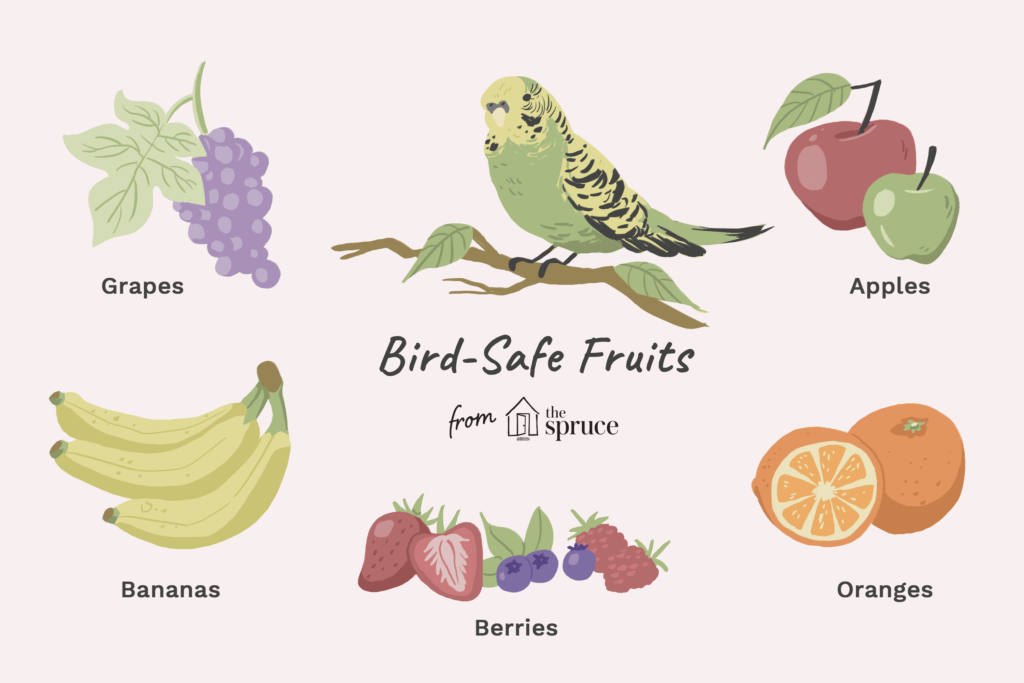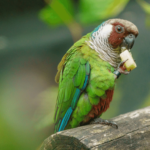Yes, parrots can eat blueberries. Blueberries are safe and nutritious for parrots.
Parrots thrive on a varied diet that includes fruits, vegetables, grains, and seeds. Blueberries offer a rich source of vitamins, antioxidants, and fiber, making them a healthy addition to a parrot’s diet. These small, juicy berries can support a parrot’s immune system and overall health.
Offering blueberries as a treat or part of their daily diet can provide both nutrition and enjoyment. Always ensure the berries are clean and pesticide-free. Moderation is key to maintaining a balanced diet for your feathered friend. Blueberries can be a delightful and beneficial treat for your parrot, contributing to their well-being and happiness.

Credit: www.reddit.com
Parrots And Their Diet
Parrots are colorful, intelligent birds. They need a balanced diet to stay healthy. A varied diet helps them thrive. Parrots enjoy fruits, vegetables, nuts, seeds, and grains. But not all foods are safe for them.
Common Foods For Parrots
Parrots eat many types of food. Here are some common choices:
- Fruits: Apples, bananas, grapes, and berries
- Vegetables: Carrots, spinach, and broccoli
- Nuts and Seeds: Almonds, sunflower seeds, and walnuts
- Grains: Quinoa, oats, and brown rice
Always wash fruits and vegetables well. Remove seeds from fruits like apples. Some seeds can be toxic.
Nutritional Needs
Parrots need a mix of nutrients. Here are some key nutritional needs:
| Nutrient | Importance | Sources |
|---|---|---|
| Protein | Builds and repairs tissues | Beans, peas, and nuts |
| Vitamins | Boosts immune system | Fruits and vegetables |
| Minerals | Supports bone health | Leafy greens and nuts |
| Fiber | Aids in digestion | Whole grains and vegetables |
Blueberries can be part of a parrot’s diet. They are rich in vitamins and antioxidants. Always give them in moderation. Avoid giving too many at once. This ensures a balanced diet for your parrot.
Blueberries As Bird Food
Parrots love fruits, and blueberries are a great choice. These small berries are tasty and packed with nutrients. Let’s explore why blueberries are good for parrots.
Nutritional Value Of Blueberries
Blueberries are rich in essential nutrients. Here’s a quick look at their nutritional content:
| Nutrient | Amount per 100g |
|---|---|
| Vitamin C | 9.7 mg |
| Vitamin K | 19.3 µg |
| Fiber | 2.4 g |
| Antioxidants | High |
Blueberries contain vitamins, fiber, and antioxidants. These nutrients are vital for a parrot’s health.
Health Benefits For Birds
Feeding parrots blueberries can offer several health benefits:
- Boosts Immunity: Vitamin C strengthens the immune system.
- Improves Digestion: Fiber aids in digestion.
- Enhances Brain Function: Antioxidants support cognitive health.
- Healthy Feathers: Vitamins promote vibrant and healthy feathers.
Including blueberries in a parrot’s diet can improve overall health. These berries are a natural and nutritious treat.
Can Parrots Eat Blueberries?
Many parrot owners wonder about their pet’s diet. Blueberries are a common question. Are these tasty fruits safe for our feathered friends? Let’s explore if parrots can eat blueberries.
Safety Of Blueberries For Parrots
Blueberries are safe for parrots. They offer many health benefits. Blueberries are rich in antioxidants and vitamins.
These fruits help boost the parrot’s immune system. They also support heart health. Always wash blueberries before serving. This removes pesticides and dirt.
Amount To Feed
Moderation is key in feeding blueberries. Too many can cause digestive issues. A few blueberries per week is ideal.
| Parrot Size | Blueberries per Week |
|---|---|
| Small Parrots (e.g., Budgies) | 1-2 |
| Medium Parrots (e.g., Cockatiels) | 3-5 |
| Large Parrots (e.g., Macaws) | 5-7 |
Observe your parrot while introducing new foods. Look for any signs of allergies. If unsure, consult a vet.

Credit: pangovet.com
Potential Risks
Feeding your parrot blueberries may seem harmless. Yet, it’s important to understand the potential risks involved. Blueberries can pose certain dangers to parrots if not given in moderation.
Allergic Reactions
Parrots, like humans, can have allergies. Blueberries might trigger allergic reactions in some birds. Signs include:
- Itchy skin
- Swelling
- Breathing difficulties
If your parrot shows these symptoms, stop feeding blueberries immediately. Consult a veterinarian for further advice.
Overconsumption Issues
Feeding too many blueberries can cause digestive problems. Parrots have small stomachs and can’t handle large quantities of fruit. Symptoms of overconsumption include:
- Diarrhea
- Stomach upset
To avoid these issues, limit blueberry intake to a few pieces. Balance their diet with other fruits and vegetables. Here’s a simple table for guidance:
| Food Type | Recommended Quantity |
|---|---|
| Blueberries | 2-3 berries |
| Other fruits | Small slices |
| Vegetables | Chopped pieces |
Maintaining a balanced diet ensures your parrot stays healthy and happy.
Introducing Blueberries To Parrots
Parrots love to explore new foods. Blueberries are a great choice. They are small, sweet, and packed with vitamins.
Introducing blueberries to parrots can be fun and beneficial. Follow these simple steps for a smooth introduction.
Gradual Introduction
Start with just one or two blueberries. This helps parrots get used to the new taste. Observe their reaction closely.
Gradually increase the quantity if they like it. This prevents any sudden dietary changes.
- Day 1: One blueberry
- Day 3: Two blueberries
- Day 5: Three blueberries
Mix blueberries with their regular food. This encourages them to try it.
Monitoring For Reactions
Watch for any signs of allergies or digestive issues. Common signs include:
- Vomiting
- Diarrhea
- Loss of appetite
If you notice any of these, stop feeding blueberries. Consult a vet if symptoms persist.
Keep a journal to track their reactions. Note any changes in behavior or health.
Benefits Of Blueberries
| Benefit | Description |
|---|---|
| Rich in Antioxidants | Helps boost the immune system. |
| High in Fiber | Aids in digestion. |
| Low in Calories | Good for maintaining a healthy weight. |
Blueberries are a healthy treat for your feathered friend. Enjoy watching them savor this delightful fruit!
Other Safe Fruits For Parrots
Parrots enjoy a variety of fruits. Blueberries are safe and nutritious for them. But what other fruits are safe for parrots? Let’s explore more.
Fruits To Include
Parrots need a balanced diet. Here are some safe fruits for them:
- Apples – Remove seeds first.
- Bananas – Peel and slice.
- Grapes – Cut into small pieces.
- Oranges – Peel and segment.
- Mangoes – Remove the pit.
Fruits To Avoid
Some fruits are harmful to parrots. Keep these fruits away:
- Avocados – Toxic to parrots.
- Rhubarb – Contains oxalic acid.
- Cherries – Remove pits first.
- Peaches – Avoid the pits.
- Plums – Remove the pits.
Always wash fruits before feeding them to your parrot. This removes pesticides and dirt. Your parrot will stay healthy and happy.
Creating A Balanced Diet
Parrots thrive on a balanced diet, which ensures they get all essential nutrients. This includes a variety of fruits, vegetables, and proteins. Blueberries are a great addition, but it’s important to combine them with other foods.
Combining Fruits And Vegetables
Blueberries are rich in antioxidants and vitamins. They provide a sweet treat for your parrot. Combining them with other fruits and vegetables can create a nutrient-rich diet. Here are some suitable options:
- Apples – Remove the seeds before serving.
- Carrots – Great source of Vitamin A.
- Spinach – Packed with iron and calcium.
- Bell Peppers – High in Vitamin C.
Always wash fruits and vegetables thoroughly before serving. This removes pesticides and dirt. Offer a variety of colors and textures to keep your parrot interested.
Incorporating Proteins
Proteins are essential for your parrot’s growth and muscle health. You can include proteins in their diet through various sources:
- Cooked Eggs – Rich in protein and easy to digest.
- Beans – Offer a variety such as black beans and chickpeas.
- Nuts – Almonds and walnuts are great choices. Avoid salted nuts.
Ensure protein sources are fresh and free from additives. Rotate different protein sources to provide balanced nutrition.
Creating a balanced diet involves mixing different food groups. This ensures your parrot gets all necessary nutrients. Always consult a vet for personalized diet plans.
Expert Tips
Blueberries are a favorite fruit for many people. But can parrots enjoy them too? Below are expert tips from veterinarians and experienced parrot owners.
Veterinarian Advice
Veterinarians agree that blueberries are safe for parrots. They offer many health benefits. Blueberries are rich in antioxidants and vitamins. These nutrients help boost a parrot’s immune system. But, moderation is key. Too many blueberries can cause digestive issues.
| Benefit | Reason |
|---|---|
| Antioxidants | Helps fight free radicals |
| Vitamins | Boosts immune system |
Experienced Parrot Owners
Experienced parrot owners share their insights on feeding blueberries. They suggest washing the blueberries well. This removes any pesticides or chemicals. Owners also recommend cutting blueberries in half. This makes it easier for parrots to eat.
- Wash the blueberries thoroughly.
- Cut them in half for easy eating.
- Offer blueberries as a treat, not a meal replacement.
Many parrot owners say their birds love blueberries. They use them as a special treat. This keeps the parrots happy and healthy.

Credit: www.pinterest.com
Conclusion
Parrots can safely enjoy blueberries as part of their diet. These berries are rich in vitamins and antioxidants. Remember to wash them thoroughly and offer them in moderation. Providing a variety of fruits ensures a balanced diet for your feathered friend.
Always consult your vet for personalized advice.
Ryan Everhart is a passionate bird enthusiast and blogger, primarily writing on his website, Avian Whispers. His journey into the world of bird blogging began with a deep interest in parrots, a species that captivated his attention for their intelligence and social behavior. Over time, his content expanded to cover a broader range of bird species, offering insights into bird behavior, care, habitats, and conservation.
Ryan is dedicated to educating his audience, which includes both new bird owners and seasoned enthusiasts. His writing is filled with personal experiences, expert knowledge, and practical advice on bird care. Through Avian Whispers, he aims to foster a deeper appreciation for birds, emphasizing their role in nature and the joys of having them as pets.
Starting with articles focused on parrots, Ryan’s work now encompasses a diverse range of topics such as feeding, training, habitat enrichment, and bird health. His love for birds extends beyond parrots, diving into various avian species. His informative and heartfelt writing reflects his commitment to the well-being of birds and the desire to help others connect with these creatures.
As a growing voice in the bird blogging community, Ryan strives to provide a platform where bird lovers can learn, share experiences, and connect over a shared passion for avian life. His blogs are not only educational but also serve as a reminder of the importance of protecting and nurturing the bond between humans and birds.




